
Torments, Torture Chambers, Executions: T4P Initiative Presents Two Submissions to the International Criminal Court
Information about extrajudicial executions of Ukrainians by the Russian military and Russian torture chambers in...
28 September 2023
On April 12, the roundtable “The Second Year of the National Human Rights Strategy Implementation: What Has Changed?” was held at America House Kyiv.
The Ukrainian Helsinki Human Rights Union, the Parliament Commissioner for Human Rights, the international technical assistance project “Participant Training Program” with the support of the US Agency for International Development (USAID) within the Human Rights in Action project organized the event.
Representatives of state administration bodies, international and non-governmental organizations, attended the event.
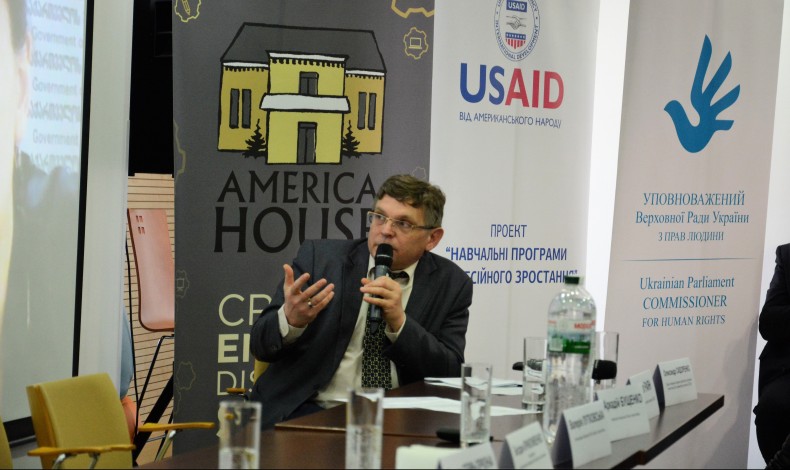
Arkadiy Bushchenko, Executive Director of UHHRU, said that the public interest is to identify factors that prevent the effective implementation of the National Strategy and Action Plan.
“We want to understand, in which direction to move forward, we want to share ideas and adjust our vision in order to understand what we do wrong. Maybe we should move on to another stage of cooperation with the government bodies, from only monitoring of the implementation of the Strategy and reporting on how it has been done to some additional measures, namely dialogue, cooperation, joint movement, joint developments for implementation of the Strategy. We believe that this document is extremely important for our country,” said Arkadiy Bushchenko in his opening speech.
On behalf of participants of the Action Plan on the Strategy implementation, the UHHRU Executive Director stressed that human rights are fundamental for public administration, are its integral part.
Valeriia Lutkovska, the Parliament Commissioner for Human Rights, said that the visa-free travel with EU member-states depends, in particular, on the state of human rights in Ukraine.
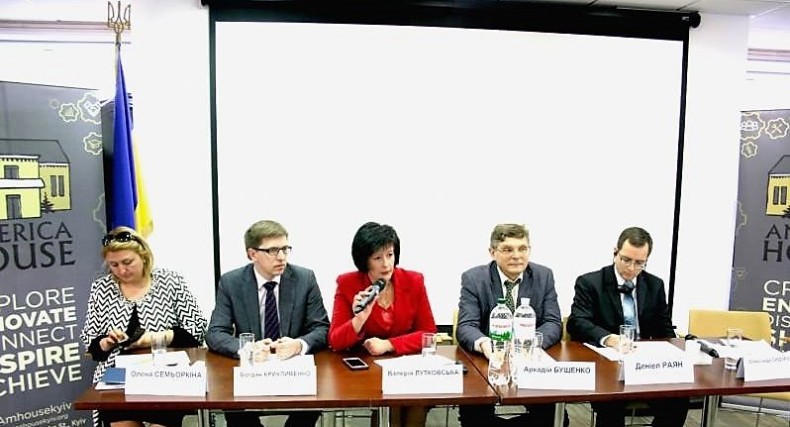
“Before taking such a fateful decision for Ukraine, the EU has identified grounds for termination of visa-free travel for any country that has received it. And one of the main grounds is a violation of human rights. For my part, I note that the last six months all delegation of the European institutions asked me questions about the National Human Rights Strategy implementation. I do not know, who would take responsibility and try to lie to European institutions that the National Strategy was performed well,” said Valeriia Lutkovska.
According to her, today, unfortunately, we cannot say that actions envisaged by the National Strategy and the Action Plan have been implemented in full.
According to the Commissioner, one reason for the ineffective implementation of the Action Plan for the National Strategy implementation is a lack of understanding of its importance by public authorities.
Daniel Ryan, Deputy Director of the USAID Democracy and Governance Office, praised the actions of state authorities and the civil society.
“The development, adoption and now implementation of the National Human Rights Strategy and the Action Plan is an unprecedented step that brings Ukraine closer to Europe”, he said.
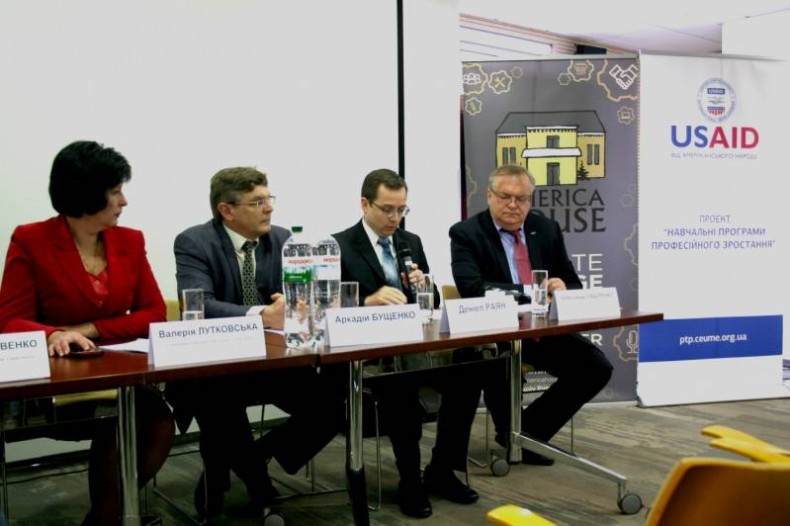
Daniel Ryan stressed the need for coordinated joint work in this direction.
“Effective implementation of the National Human Rights Strategy requires a concerted effort, funding from the government and implementation from the Ombudsman’s Office and the civil society – further active participation in monitoring of its implementation, a deep understanding of human rights – from the whole society. For our part, we promise that we will continue to provide technical and expert support in this process”, assured Daniel Ryan.
Oleksandr Sydorenko, Director of the Participant Training Program project of the US Agency for International Development (USAID), spoke about the educational program “Development, monitoring and evaluation of the National Human Rights Strategy and its implementation plan.” The program was to familiarize the participants with the experience of Sweden in order to develop knowledge and skills that are crucial for the development, implementation, and monitoring of the National Human Rights Strategy and the Action Plan, as well as for awareness-raising campaigns on human rights, including educational activities on human rights. Oleksandr Sydorenko awarded certificates to participants of the program.
The roundtable consisted of several thematic parts. After the presentation, live broadcasting from the Human Rights Secretariat of the Administration of the Government of Georgia took place. Natalia Jaliashvili, Head of Human Rights’ Secretariat of Government Administration, and Ana Khizanishvili, Advisor to Human Rights Secretariat of the Administration of the Government of Georgia, spoke about the experience of the country in implementing the Strategy in the field of human rights, which had been approved by the Parliament of Georgia in 2014. Its action plan had been approved for 2 years. The implementation of the Strategy in Georgia occurs in conjunction with state authorities, civil society organizations and was controlled by the Parliament.
Then there were 4 thematic sessions on various aspects concerning the implementation of the National Strategy.
Session 1. The introduction of experience of Sweden in the human rights strategies implementation.
During the first block, presentations prepared by alumni of the program “Development, monitoring, and evaluation of the national human rights strategy and its implementation plan” of the Participant Training Program project of US Agency for International Development. Participants talked about the experience of Sweden.
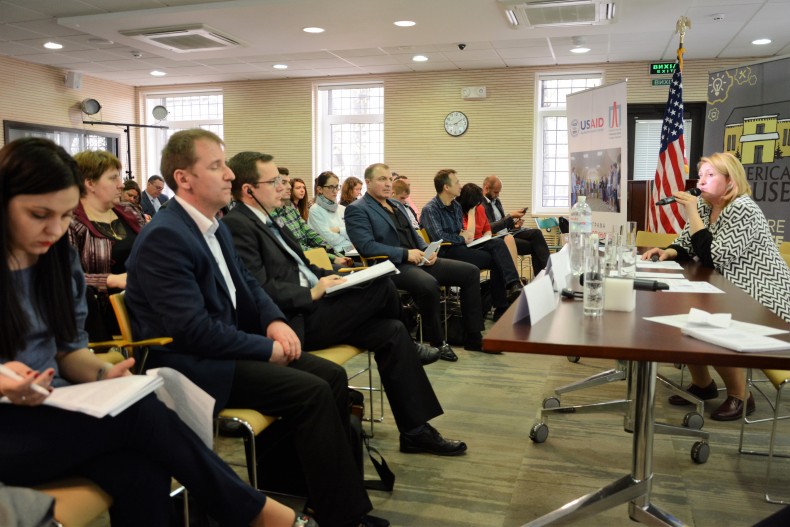
Olena Semiorkina, an analyst and expert on law making of UHHRU, described the development and implementation of policies in the field of human rights. The theme of the report was devoted to general problems associated with the protection of human rights in Ukraine and Sweden.
Ivan Yurchik, an expert of The Association of Ukrainian Human Rights Monitors on Law Enforcement, presented a comparative analysis of approaches to the evaluation of the National Human Rights Strategy.
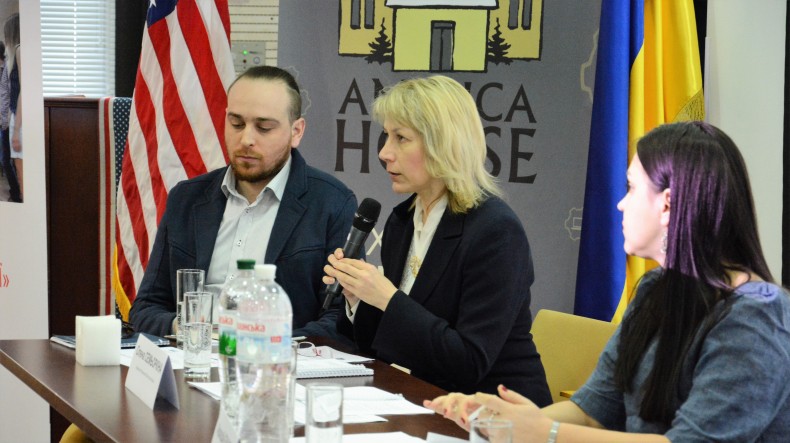
Mariia Krasnenko, a lawyer of NGO “Donbass SOS”, said about the application experience of Sweden in the integration of refugees into the local community, which was also part of the implementation of the National Human Rights Strategy.
Bohdan Moysa, a coordinator of the analytical unit of UHHRU, presented the report on the implementation of the strategic priorities in human rights at the level of cities. He chose the result of the Swedish city of Västerås as an example. Also, Alla Blaha presented another report of the analytical unit of the Union.
Tatiana Pechonchyk, chairman of the Human Rights Information Centre, told about educational activities and human rights education in Sweden.
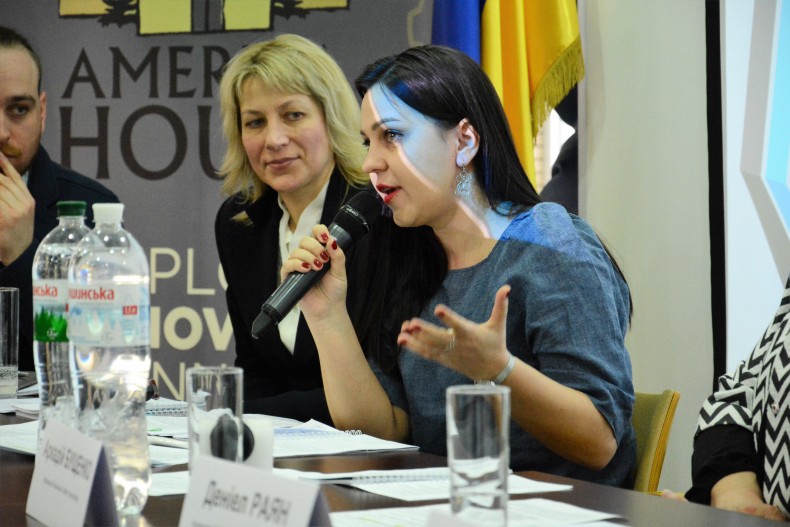
Presentations are available for review at the link.
Session 2. Implementation of the National Human Rights Strategy in local communities.
Participants of the second thematic block were Andrii Halai, coordinator of the ‘Human Rights Passportisation of Areas’ project of UHHRU, and Oleksandr Vinnikov, a member of the supervisory board of the Chamber of Tax Consultants, legal advisor of the Center for International Private Enterprise. Andrii Halai described the concept of local human rights index. His publications on this topic can also be found on his personal blog on our website.
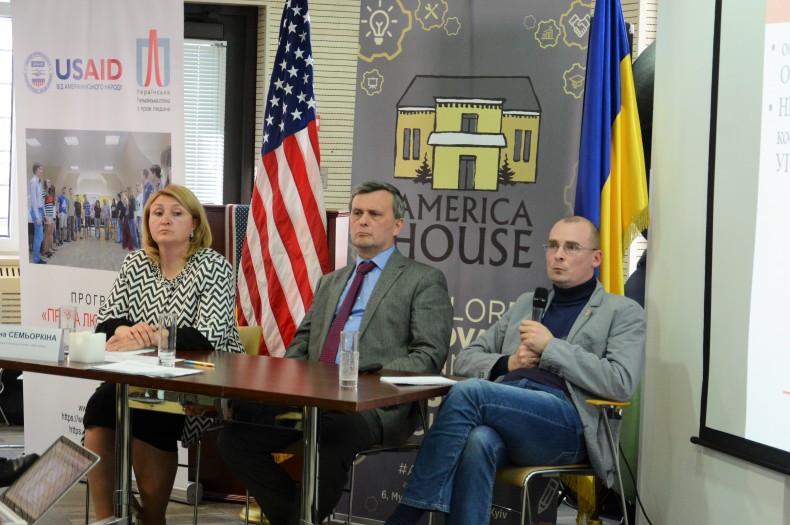
Oleksandr Vinnikov highlighted issues of freedom of entrepreneurship and the reform of the simplified tax system within the framework of the Association Agreement with the EU.
Session 3. Human rights education. Presentation of best practices.
Serhii Burov, Head of the educational unit of UHHRU, was a speaker of the session. He appreciated the performance of the government action plan in the field of education, including education on the issue of human rights.
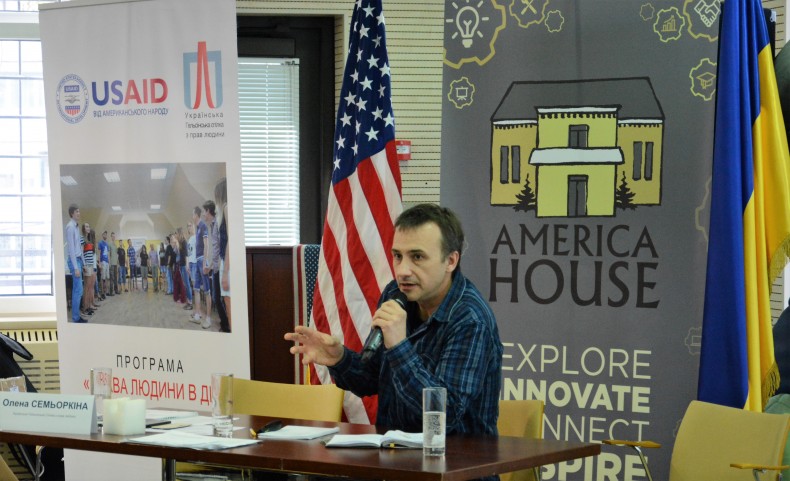
Session 4. Barriers to the National Human Rights Strategy implementation.
The final session summed up the results of the following stage of the implementation of the National Strategy. The following issues were announced:
At the end of the session, it was suggested to establish a new structure of interaction of monitors and performers of the Action Plan. Namely, the creation of the Coordinating Council, whose functions will include:
It was also proposed to combine NGO monitors in thematic expert councils, whose main task would be to work with central executive bodies. It will consist of thematic meetings of monitors of the National Strategy performers in central executive bodies and reports every three months. Objectives of the meeting:
The video of the roundtable is available: https://youtu.be/WlE2xxFct_8
If you find an error on our site, please select the incorrect text and press ctrl-enter.

Information about extrajudicial executions of Ukrainians by the Russian military and Russian torture chambers in...
28 September 2023

Since the onset of the full-scale invasion, the «Tribunal for Putin» initiative has recorded about...
18 August 2023

Position of Ukrainian organizations of the Human Rights Houses Network and Ukrainian lawyers on the...
17 July 2023

On June 6, 2023, the Southern Area Military Court of Rostov-na-Donu sentenced Mr.Bohdan Ziza, a...
08 June 2023